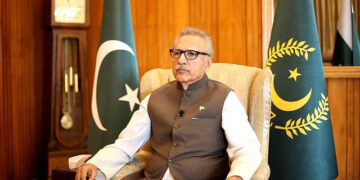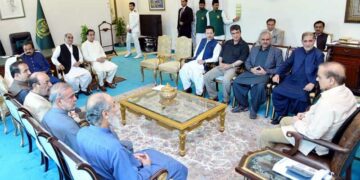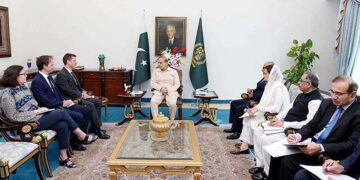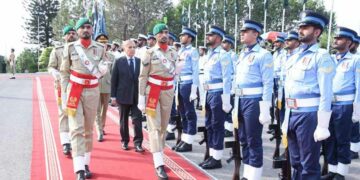 Chief Justice of Pakistan, Justice Iftikhar Muhammad Chaudhry on Monday said that this judiciary has been trying to rewrite the constitutional and political history of this country by not only atoning sins of the past but also setting up new precedents ensuring transparency, rule of law and enforcement of fundamental rights as enshrined in the Constitution.
Chief Justice of Pakistan, Justice Iftikhar Muhammad Chaudhry on Monday said that this judiciary has been trying to rewrite the constitutional and political history of this country by not only atoning sins of the past but also setting up new precedents ensuring transparency, rule of law and enforcement of fundamental rights as enshrined in the Constitution.
Addressing the 99th National Management Course participants, the chief justice observed that many landmark judgments have been handed down wherein State agencies have been directed to abide by the Constitution and the law, keep within their limits and let the system work and grow. In some judgments, the civil servants have been directly addressed and asked to stick to the rules and regulations come what may, he added. “It is my firm belief that strong institutions provide the bedrock for building everlasting mechanisms and sustaining socio-economic, political and cultural growth and development.
To establish and run national institutions, we need a qualified, well-trained, inspired and dedicated bureaucracy, which has the capacity and necessary means to anticipate the mounting socio-economic challenges and come up with workable solutions both in the short and long run,” the chief justice remarked. He said that any developing country like Pakistan the basic requirements for enhancing national growth through competitiveness are pegged on the four pillars including strengthening of institutions, infrastructure development, economic growth and advancement in health and educational fields.
These four pillars form the foundation for achieving competitiveness for ensuring socio-economic growth of our country and these four drivers of growth can only deliver if you as civil servants put them to good use, he added. The Chief Justice also quoted a famous quotation of Douglas North, a Nobel Laureate in Economics, which is worth quoting here. He said: “Institutions are simply the rules of the game in a society. The growth and development of a society mainly depends upon the rules and regulations which it adopts for itself. If the rules and regulations create a level playing field and provide equal opportunity to all under the constitution and law, then a society is bound to grow”.
He said that the similar inspirations come from our founding father, the Quaid-i-Azam Mohammad Ali Jinnah, when he states in a public broadcast in February 1948: The Constitution of Pakistan has yet to be framed by the Pakistan Constituent Assembly. I do not know what the ultimate shape of this constitution is going to be, but I am sure, that it will be democratic type, embodying the essential principles of Islam.Today, they are as applicable in actual life as they were 1,300 years ago. Islam and its idealism have taught us democracy. It has taught equality of man, justice, and fair-play to everybody.
Chief Justice Iftikhar Chaudhry said that the Constitution of Pakistan, 1973 envisages in detail many fundamental rights to the citizens of the country and these rights including right of individual to be dealt with in accordance with law; security of person; safeguard as to arrest and detention; right to fair trial; inviolability of dignity of man; freedom of movement; assembly, association; trade; business or profession; speech, information; freedom to profess the religion; protection of property rights; equality of citizens; right of education; safeguard against discrimination in service and last but not the least the promotion of social and economic well being of the people and these fundamental rights enshrined in the Constitution have to be implemented in letter and spirit.
Gone are the days when stability and security of the country was defined solely in terms of number of missiles and tanks as a manifestation of coercive hard power available at the disposal of the State as today, the concept of national security has been redefined as a polity wherein a State is also bound to provide its citizens social security, create welfare nets and protect their fundamental rights and freedoms. He said that our founding father Quaid-i-Azam, who was desirous of seeing Pakistan a modern, developed and resourceful nation-state, said: “It is all very well to talk of Muslims as a nation and to demand a separate homeland for them, a homeland in which they can live according to their own right and shape their own destiny, but do you realize that such a State would be useless if we did not have the men, the material and the where with all to run it?”
He said that the Courts are seized with many issues related to enforcement of constitutional provisions, be it the issue of law and order situation in Karachi or Balochistan, the failure of implementation framework or any other footprints of ill-governance, maladministration, etc. He said that a public servant as a functionary of the state must be a beacon of light for the rest of the community and in discharge of their duties and performance of functions, they should not be moved by considerations of nationality, sectarianism, ethnic, social or political background. He said that the bureaucracy is one institution which is characterized by continuity and therefore, you are doubly responsible for not only sharing your future vision and implementation plan with your political bosses but also ensuring that these plans are put into action without fear or favour. -Brecorder












